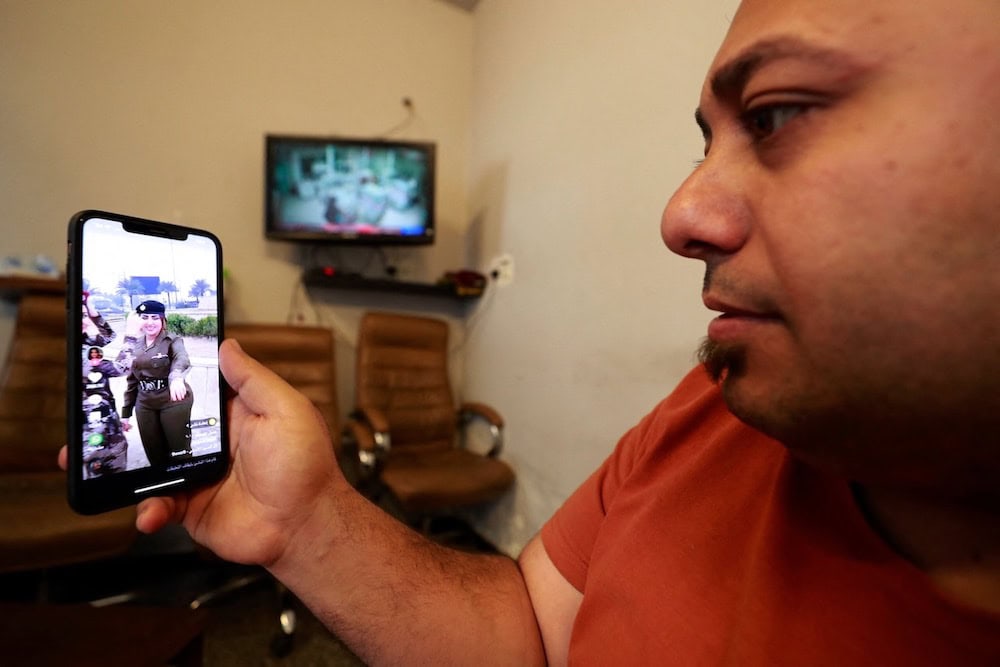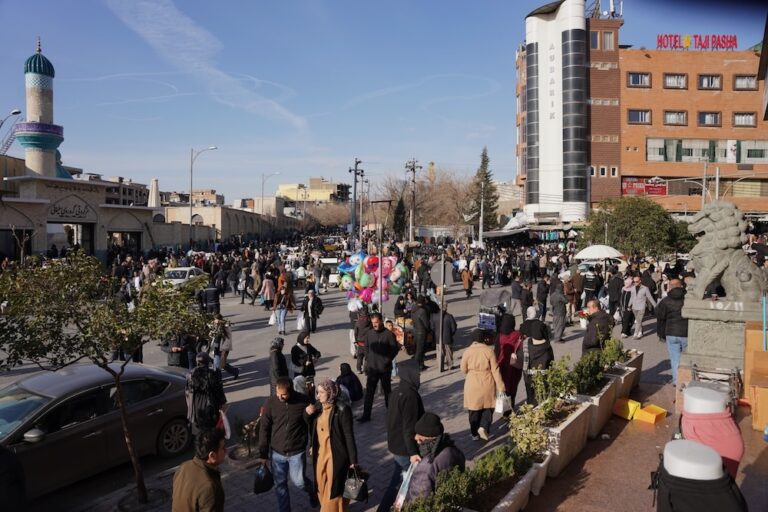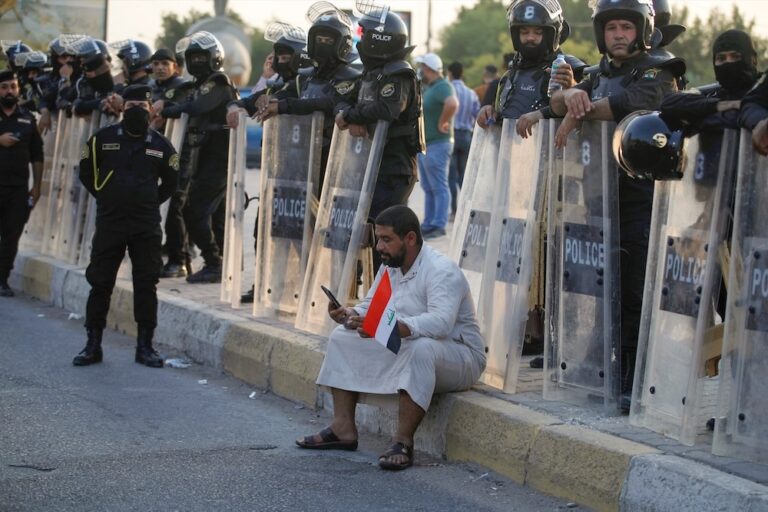Freedom of expression fears grow with a proposal to ban the online platform, unveiling broader censorship concerns.
This statement was originally published on smex.org on 15 May 2024.
On March 24, Minister of Communications Hiyam Al Yasiri announced she submitted a request to the Iraqi Council of Ministers to ban TikTok. Al Yasiri accused the app of “dismantling the fabric of Iraqi society and bringing no scientific or educational benefits,” and that it is “merely an entertainment application.”
At the end of the press conference, Al Yasiri emphasized the “need to cooperate with members of Parliament to block such applications.”
The Minister of Communications’ statements raised serious questions among Iraqis about the state’s possible ban of such platforms, especially after successive government decisions that compromise freedom of opinion and expression in Iraq. For example, the recently issued Law on Freedom of Expression, with its penalties and ambiguous terminology, conflates and confuses provisions related to free speech, the press, and the right to protest.
In recent years, Iraqi authorities have made a series of decisions that undermine freedom of expression, the most recent being a “state order” issued by the Iraqi Federal Supreme Court to ban all pornography websites in the country. The Cybercrime Law, which caused controversy among members of Parliament due to its stipulated penalties, also affected freedoms.
In an interview with SMEX, Hayder Hamzoz, Executive Director of INSM Foundation for Digital Rights in Iraq, said that the reason behind banning TikTok remains undeclared. “It is an attempt to subjugate the platform and oblige it to respond to the demands of the Iraqi Ministry of Communications about content moderation and removal, especially that TikTok does not conform to Iraqi customs and traditions.”
Hamzoz does not rule out rampant corruption as a primary reason behind the decision. “The Iraqi government finds itself incapable of controlling the content published by expats or by users inside Iraq, especially in Erbil and other areas not subject to government rule, and it is well aware of the influence of such content on the Iraqi society and on unveiling corruption.”
“As such, the government is unable to reach most of these users, and at the same time, TikTok is not responding to the government’s requests,” added Hamzoz, highlighting that banning TikTok is an “ineffective and useless step at the technical level.”
Figures from the Digital Media Center, an Iraqi NGO that follows and monitors digital news, show that the number of TikTok users in Iraq reached 31.95 million in 2024, compared to 23.88 million in 2023. This number means that around 75% of Iraqis use TikTok, a percentage higher than any other social media platform, knowing that the total population in the country is around 43 million.
Economic and Digital Damage to Iraqis
Banning social media applications and websites affects freedoms in the country and compromises the interests of users who use such platforms for their businesses.
In an interview with SMEX, Revan Al-Tamimi, Iraqi owner of a content creation company, explained that TikTok has become a source of livelihood for many individuals, institutions, and e-store owners and has become the most popular platform in the country. Banning TikTok would deprive users, particularly owners of shops, startups, and local and low-income enterprises, of the opportunity to promote their products and services for free.
From a political perspective, Al-Tamimi doubts the government can apply such a decision, given that it uses TikTok to promote its achievements. This opinion resonates with a significant portion of the Iraqi general public.
In December 2023, when TikTok was banned in Jordan after demonstrations that sparked in Ma’an in objection to rising oil prices, protestors connected to Virtual Private Networks (VPN) to circumvent the ban and post their videos. This strategy was the only solution to access the application, which Iraqis would likely resort to if the ban was applied in their country.
According to Hamzoz, if the ban is enacted in Iraq, the problem would not lie in using VPNs, which are recommended to protect users from tracking and preserving their digital security, but in the applications downloaded from specific networks. Some users may download unsafe software, subjecting their devices and personal data to breaches. Using undocumented VPNs is unsafe and can allow third parties access to user information and personal data.
Hamzoz concludes by explaining that previous decisions on combating substandard content revealed the hypocrisy of security forces in Iraq. They paved the way for blackmail by Iraqi officers, as several officers in the Ministry of Interior created fake social media pages to blackmail colleagues for money.
A Long History of Controlling Social Media and the Internet
The Iraqi state’s decisions issued in recent years demonstrate an insistence on controlling the country’s digital space. Last August, authorities banned Telegram for reasons related to “national security and societal peace.”
In addition, last February, AlHudood’s satirical website was banned without any official statement issued in its regard. This ban constitutes a violation of freedom of opinion and media because the decision is not rooted in law and contradicts the freedom of the press and publishing guaranteed in the Iraqi Constitution, laws, and international conventions, not to mention that bans and shutting down websites and pages should occur exclusively by judicial rulings.
Under the pretext of preventing cheating in exams, the Iraqi government has been cutting off the internet for consecutive hours, several days in a row between May, June, and July every year. This practice has been employed consistently since 2016.
During the widespread protests that swept the country in 2019, the Iraqi authorities banned most social media platforms before cutting off the internet almost completely. Protestors were left with phone calls and SMS as their only means of communication to restrict them and thwart their demonstrations.
In this context, Hamzoz asserts that Iraq “does not need decisions to isolate or block applications or to control content on the internet, but requires clear legal policies and instructions that organize, rather than restrict, work and content.
On January 10, 2023, the Iraqi Ministry of Interior launched the “Ballegh” platform, “an electronic platform for reporting social media content that violates public morals, contains negative and indecent messages, and undermines social stability.” The Ministry also posted a video on YouTube where an officer explained the purpose of launching the platform and urged citizens to report “indecent content that violates public morals, customs, traditions, and is disrespectful towards military institutions.” The officer stated that authorities “will combat this content, which is as serious as organized crime since it undermines the values of the Iraqi family.”
Such decisions paved the way for violence and incitement against users, portraying them as enemies of Iraqi society and its moral values. This ruling led to painful and shocking incidents, such as the assassination of Iraqi influencer Umm Fahd by gunfire outside her home on April 27, 2024. Umm Fahd, whose real name is Ghofran Sawadi, had been sentenced to six months in prison for posting a video that “violates public morals and decency,” as per the court decision.
Hamzoz concluded by emphasizing the need to launch awareness campaigns about digital rights, as well as the benefit of establishing legal advisory clinics for citizens to protect them from possible digital violence and acquaint them with peaceful and safe practices to avoid threats on their digital, physical, and psychological security, especially women, who are significantly exposed to digital violence and hate speech.



